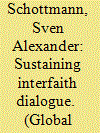| Srl | Item |
| 1 |
ID:
096838


|
|
|
|
|
| Publication |
2010.
|
| Summary/Abstract |
Second generation Australians from a Muslim background have appeared on the political radar recently as a group at risk of disengagement due to their potentially split allegiances. For these young Australians, the traditional tension over diasporic allegiances between the homeland and the country in which they live is further complicated by religious identity. This paper offers two case studies of the second generation of two mainly Islamic, but otherwise very different, ethnonational communities in Australia, Turkish and Iranian. It examines the responses of these groups to the rising essentialisation and ethnicisation of Islam, at the expense of ethnic and sociocultural difference. In particular, the paper focuses on the way secular practice and religious identity converge into 'cultural Islam'. We use the term cultural Islam as a way of describing those, particularly of the second and third generations in Australia, who proudly claim their Islamic heritage while choosing not to participate actively in religious life.
|
|
|
|
|
|
|
|
|
|
|
|
|
|
|
|
| 2 |
ID:
125063


|
|
|
|
|
| Publication |
2013.
|
| Summary/Abstract |
Present-day Australia is often described as a successful example of a modern multicultural state. A growing number of non-British and non-European migrants have helped transform the country into an increasingly plural society. Intolerance and even outright racism persist in a few sectors, but on the whole, Australia's political, cultural and intellectual elites have accepted the need for migration, even if they have not always rushed to embrace the concept of multiculturalism. The most cursory of surveys of Australian cities, suburbs and even rural areas would readily reveal the extent to which the country has changed from the days of the 'white Australia' policy. Ethnic and cultural pluralism are just two measures of this new social pluralism; the growing diversity of religious expression is another very important dimension of Australia's multicultural reality. As Michális S. Michael points out, a key 'antidote to the politics of fear' has been the range of interfaith and multi-faith councils and networks that were set up in the course of the last 10 years. Some of these efforts were, in part at least, driven by what Joseph Camilleri describes as a 'narrow understanding of social cohesion' undertaken 'in the hope that dialogue would more effectively integrate [Muslims] into the mainstream'.3 They reflect still common views of Muslims as a 'problematic' minority prone to radicalization and the tendency to self-segregate. Nonetheless, these efforts of facilitating engagement across religious lines are a belated recognition of the social, economic and political significance of Australia's religious diversity, indeed of the enduring role religion plays in the modern, secular world.
|
|
|
|
|
|
|
|
|
|
|
|
|
|
|
|